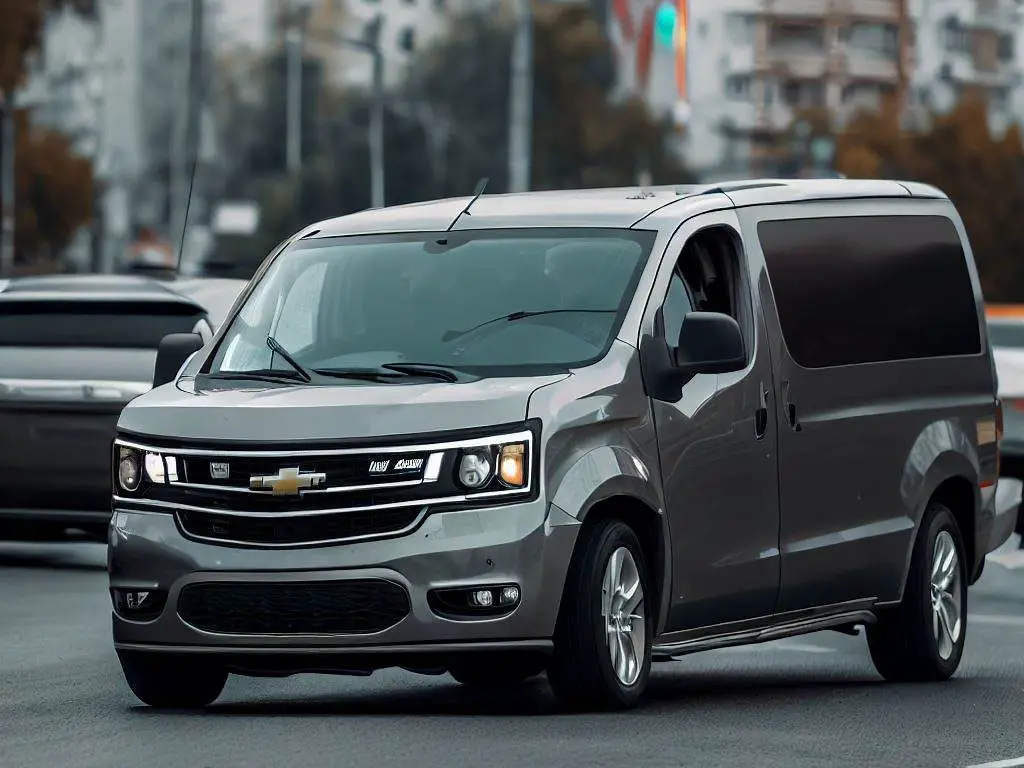Chevrolet Express Best and Worst Years
The Chevrolet Express has been a popular choice in the full-size van market since its debut in 1996. Known for their cargo capacity, passenger comfort, and powerful engine options, these workhorses have earned a solid reputation over the years.
However, just like any vehicle on the used car market, some model years shine brighter than others while some are best avoided altogether. In this blog post, we’ll delve into the best and worst years of the Chevrolet Express to help you make an informed purchasing decision and get behind the wheel of a reliable van that suits your needs and capability perfectly.

Are you fan of Chevrolet car? Check this out: Chevrolet Impala Best and Worst Years
Key Takeaways
- The best model years for Chevrolet Express vans are 2011, 2014, 2015, 2016, 2018, 2020, and 2021 due to their enhanced safety features, improved cargo capacity, infotainment options, and better reliability.
- On the other hand, the worst model years of Chevy Express include vehicles manufactured in 1999 – 2001 and from 2004 to the present day (excluding newer models), which reported common issues ranging from engine problems to electrical malfunctions.
- Common problems associated with Chevy Express vans include rust and corrosion on body panels that can lead to serious structural issues affecting passenger safety; uncomfortable seating causing back pain or neck strain; faulty transmissions that can result in erratic shifting or slipping gears; engine defects causing power loss or stalling; and frequent electrical problems leading to dead batteries or malfunctioning gauges.
- While Chevrolet Express vans are generally reliable years if properly maintained with regular service check-ups by a professional technician. It’s important not only to inspect your vehicle before purchasing it but also consider factors such as usage patterns when deciding which specific year may be best-suited based on needs.
Best And Worst Chevrolet Express Model Years
The Chevrolet Express has had several great model years, including 2011, 2014, 2015, 2016, 2018, 2020, and the latest model year of 2021.
Best Model Years: 2011, 2014, 2015, 2016, 2018, 2020, And 2021

Car enthusiasts will appreciate the impressive aspects of the best Chevrolet Express model years, which include:
- 2011: Enhanced safety features and the introduction of two new engine options, delivering both power and fuel efficiency.
- 2014: A redesigned exterior and improved cargo capacity make this year’s model an attractive option for commercial users.
- 2015: Introduction of high-end infotainment system options with MyLink touchscreens, as well as an optional Wi-Fi hotspot.
- 2016: Upgraded interior features with more comfortable seating and a standard rearview camera in all models for enhanced safety.
- 2018: Availability of a powerful yet fuel-efficient diesel engine for greater towing capacity and reduced maintenance costs.
- 2020: Improved reliability backed up by a ranking of 15th out of 80 generations in dependability, highlighting the relative absence of common mechanical issues found in earlier models.
- 2021: Enhanced safety ratings supported by the inclusion of more standard driver-assistance technologies while maintaining its strong resale value.
Worst Model Years: 1999, 2000, 2001, 2004, 2010, 2013, And 2017

The Chevrolet Express has had its share of troubles over the years. Here are the worst model years to look out for if you’re considering purchasing a used Chevy Express:
- 1999: This year had numerous complaints about engine problems, including stalling and loss of power while driving.
- 2000: Owners reported issues with transmission failure and electrical malfunctions in this model year.
- 2001: Many drivers experienced trouble with their engines, leading to costly repairs and replacements.
- 2004: This year’s model was notorious for rust and corrosion on the body and undercarriage.
- 2010: Transmission problems were common in this year, causing difficulty shifting gears or even complete failure.
- 2013: The engine in these vans showed a tendency to fail prematurely, often resulting in costly repairs or replacement.
- 2017: Electrical issues plagued many vehicle owners of this model, causing dashboard lights to malfunction or complete loss of power.
These models may be best avoided unless you’re willing to deal with the potential problems they bring.
Related articles:
Chevrolet Malibu Best and Worst Years
Chevrolet Silverado 1500 Best and Worst Years
Recent Model Year Improvements
In recent years, Chevrolet has made significant improvements to the Chevy Express van. One of the biggest changes is in the engine options. The newer models come with more powerful and efficient engines that provide better performance and fuel efficiency.
Another improvement is in cargo capacity. Newer models have larger cargo areas than older ones, allowing for more storage space for equipment or materials.
Furthermore, recent models have new safety features such as lane departure warning and security system and forward collision alert system which help drivers avoid accidents on highways or busy city streets.
Overall these improvements make newer Chevy Express cargo vans more reliable than their predecessors while providing a better driving experience for passengers or drivers alike who require flexibility from their vehicle choices regardless if they’re just going to work or doing errands around town.
Common Problems With Chevrolet Express Vans
Chevrolet Express vans commonly experience electrical issues, transmission troubles, engine problems, rust and corrosion, and uncomfortable seating.
Electrical Issues
One of the most common problems that you may encounter with a Chevrolet Express van is electrical issues. These can manifest in various ways, such as faulty wiring, dead batteries, or malfunctioning gauges and electronics.
Some drivers have reported intermittent power loss or complete electrical failure while driving, which can be dangerous and frustrating.
To avoid these problems, regular maintenance checks should always include an inspection of the battery and charging system. Additionally, it’s important to pay attention to any warning signs like flickering lights or strange noises from the engine bay.
Addressing these issues early on could save you time and money down the road.
Transmission Troubles
One of the common problems with Chevrolet Express vans is transmission troubles. The earlier versions of the cabin vans had issues such as erratic shifting, slipping gears, and frequent breakdowns.
These problems can be quite a repair costs and may affect the overall performance of the vehicle. According to statistics, in the first-generation Chevy Express models there have been more than 200 complaints about transmission problems.
This highlights how important it is for potential buyers to carefully inspect their vehicles before purchasing them, especially if they are buying a used t a particular model.
Engine Problems
One of the most common problems associated with the Chevrolet Express is engine troubles. This issue has plagued several model years, causing frustration for many owners of vans.
Among the reported complaints are power steering, stalling, and oil consumption problems.
For example, in 2016, a recall was issued for certain Chevy Express vans due to an engine defect that can cause fires in affected vehicles. From this incident alone, it is clear how serious engine problems can be in these vans.
Rust And Corrosion
Rust and corrosion can be a major concern for owners of Chevrolet Express vans, especially in older models. The high risk of rust is due to the van’s heavy-duty nature and its frequent exposure to harsh weather conditions.
Rust can lead to serious structural issues that can affect the safety of passengers, cargo, and even other vehicles on the road.
According to statistics gathered from previous complaints about Chevy Express models,
rust was one of the top complaints across all years’ makes. For example; Different regions will have different risks associated with their environments that may foster this problem like salt air for coastal cities or city pollution in an urban metropolis.
Uncomfortable Seating
Many Chevrolet Express models have been reported to have uncomfortable seating, which is a significant concern for those who spend a lot of time in their van.
The seats may be too narrow and lack support, causing back and neck strain.
Luckily, there are some solutions to this problem. Chevy Express owners can consider replacing the original seats with more comfortable aftermarket options or adding seat cushions for additional support.
Another solution would be adjusting the seat position or installing lumbar support to make long rides more comfortable.
How Reliable Are Chevrolet Express Vans?
Chevrolet Express vans are generally reliable, but the dependability of each model year can vary greatly based on factors such as proper maintenance and any recalls or known issues.
Dependability Of Model Years
Chevrolet Express vans have had varying levels of dependability throughout the years, with some models proving to be more reliable than others. The table below offers a quick glance at the dependability of the highlighted best and worst model years.
| Model Year | Dependability | Remarks |
|---|---|---|
| 1999 | Low | One of the worst years due to a number of engine problems. |
| 2000 | Low | Another unreliable year with recurring engine issues. |
| 2001 | Low | Common problems include engine and electrical issues. |
| 2004 | Low | Electrical problems were prevalent in this model year. |
| 2005 | High | Considered the best among the older models due to fewer issues. |
| 2010 | Low | A problematic year, with complaints centered around the engine. |
| 2013 | Low | Noted for its transmission troubles and poor reliability. |
| 2017 | Low | Included in the worst years list due to engine and electrical issues. |
| 2018 | High | A dependable model year with fewer reported issues. |
| 2020 | High | Recent model improvements have led to increased dependability. |
| 2021 | High | Continued improvements have made this a reliable model year. |
Average Lifespan Of Chevrolet Express Vans
The lifespan of Chevrolet Express vans depends on several factors, including maintenance, mileage, and usage. On average, a Chevy Express can last up to 200,000 miles before needing major repairs or replacement.
One key factor that affects the longevity of Chevy Express Vans is the type of engine installed. Diesel engines tend to last longer than gas engines as they are built to withstand higher pressures and temperatures.
Regardless of the model year you choose, it’s crucial to keep up with regular maintenance tasks such as oil changes and tune-ups. Additionally, paying attention to warning signs indicating potential problems can help prevent average cost repairs down the road.
Factors Affecting Reliability
There are a variety of factors that can affect the reliability of a Chevrolet Express van. Some key factors to consider include:
- Maintenance and Repairs: Regular maintenance and timely repairs are crucial to keep any vehicle running smoothly. Neglecting these tasks can lead to more severe issues down the road.
- Driving Conditions: The way in which a van is driven can have a significant impact on its reliability. For example, if a van is frequently used for towing or carrying heavy loads, it may experience more wear and tear than one used for lighter-duty purposes.
- Climate and Environment: The climate and environment in which a van operates can also play a role in its longevity. Extreme temperatures, excessive moisture, and exposure to salt or other corrosive materials can all accelerate wear and tear on critical components.
- Vehicle Age: As with any vehicle, older Chevy Express vans may be more susceptible to breakdowns and mechanical issues than newer models.
- Mileage: The mileage accumulated by a van can also impact its reliability. High-mileage vehicles may require more frequent repairs and maintenance than those with lower mileage.
- Usage history: A van’s usage history should also be considered when assessing its reliability. If it has been involved in accidents or experienced major mechanical issues in the past, this could indicate future problems.
By considering these factors when purchasing or maintaining your Chevy Express van, you’ll be better equipped to ensure its long-term reliability and performance on the road.
Choosing The Right Chevrolet Express Model
Assess your needs by considering the cargo capacity, passenger comfort, and fuel efficiency of the Chevy Express model that you need.
Assess Your Needs
Before choosing your Chevrolet Express van, it is crucial to assess your needs carefully. Determine what you will be using the van for and how much cargo or passenger configurations you require.
For example, if you’re looking for a work vehicle, consider opting for a cargo model with ample storage capacity and easy loading/unloading features.
Additionally, think about the terrain and weather conditions of where you’ll be driving; if icy roads are common in your area during the winter months, consider investing in an all-wheel drive Chevy Express.
Research The Specifications
To ensure that you’re getting the most out of your Chevrolet Express van, it is essential to research its specifications. This means looking at things like cargo capacity, engine options, fuel efficiency, and passenger comfort.
For example, if you plan on using your van for transporting goods or equipment, it’s important to get one with a high cargo capacity.
Additionally, researching the specifications can help you determine what maintenance requirements are needed and how long your Chevy Express van may last before needing major repairs or parts replacement.
Professional Inspection
If you’re in the market for a Chevrolet Express van, it’s essential to have it inspected by a professional before making your purchase. A thorough inspection can help uncover any hidden problems that may not be immediately evident during a test drive.
A professional inspection should include an assessment of the engine, transmission, brakes, suspension, steering components, and electrical system. The mechanic should also check for signs of rust or corrosion and inspect the vehicle’s undercarriage.
By having an expert thoroughly examine the vehicle before you buy it, you can avoid costly repairs down the road while ensuring that you are getting your money’s worth from your purchase.
Maintenance And Repair History
Maintenance and repair history plays a crucial role in determining the reliability of any vehicle, including the Chevrolet Express. It’s important to conduct research on the maintenance requirements of your chosen model year before making a purchase.
Additionally, it’s wise to consider the overall repair history of previous owners or fleet operators. Any evidence of frequent repairs or replacements may point towards underlying issues that could become costly down the line.
It is essential to keep up with regular maintenance routines like oil changes for smoother performance and longevity expectations for every Chevrolet Express van model year regardless if you are planning on using it for cargo purposes or passenger transport needs.
Budget Considerations
When choosing the right Chevrolet Express model, budget considerations are a crucial factor. While newer models may have more features and be less prone to mechanical issues, they also come with a higher price tag.
It’s important to determine your budget before beginning your search for a Chevy Express van. Take into account factors such as financing options, insurance costs, and potential repairs that may arise in the future.
Ultimately, striking a balance between your budget and your needs is key when choosing the right Chevrolet Express model.
Conclusion

In conclusion, when it comes to choosing the best and worst years for a Chevy Express van, it’s important to do your research. As we’ve outlined above, there are certain model years that have had more issues than others.
However, newer models have seen significant improvements in terms of safety features, fuel economy, and overall reliability. It’s also crucial to assess your specific needs before making a purchase decision – whether you need a cargo van or one with comfortable seating for passengers.
FAQs:
1. What are the best years for a Chevrolet Express van?
According to experts, the 2018 model year is considered one of the best due to its improved interior and updated infotainment system. The 2019 model also received praise for its comfortable ride and solid build quality.
2. Which years should be avoided when purchasing a used Chevrolet Express van?
Some of the worst years for Chevrolet Express vans include the 2007-2008 models due to frequent transmission problems and electrical issues. The 2015 model year also had several complaints about engine failure and steering problems.
3. Are there any common mechanical issues with Chevrolet Express vans?
Over time, some common issues may arise such as faulty sensors or damaged fuel pumps. However, regular maintenance including oil changes and inspections can help prevent major mechanical problems from occurring.
4. Is it worth buying an older model of a Chevrolet Express van instead of a newer one?
This depends on personal preference and budget constraints as older models may come with more wear-and-tear but could potentially have lower price points than newer versions with less mileage or damage history. It’s important to consider your individual needs before making a purchase decision in order maximize value without sacrificing safety or reliability over time.
| Question | Answer |
| What is the Chevrolet Express? | The Chevrolet Express is a popular line of full-size commercial vans that are used for cargo transportation and as passenger vehicles. |
| What are the best years for the Chevy Express van? | According to experts, the best years for Chevy Express vans are from 2003 to 2010 model years when it comes to reliability and longevity. |
| What are the worst years for the Chevy Express van? | The worst Chevy Express years are generally considered to be the early model years such as 1997 to 2002 due to engine problems and other issues. |
| What are the different engine options for the Chevy Express? | The Chevy Express comes with a variety of engine options including a V6, V8, and diesel engines, as well as different engine power and torque capabilities. |
| What is the 2020 Chevy Express lineup like? | The 2020 Chevy Express lineup features several engine choices and a range of payload options, making it a versatile and dependable commercial vehicle for businesses and individuals. |
| Are there any known engine problems with the Chevy Express? | Some Chevy Express van owners have reported engine problems such as excessive oil consumption, oil leaks, and intake manifold gasket and piston ring issues, especially with higher mileage vehicles. |
| What is the active fuel management system in the Chevy Express? | The active fuel management system is a technology used in some Chevy Express vans to increase fuel efficiency by shutting down some engine cylinders when they are not needed, but it can also cause oil consumption problems. |
| How can I prevent or fix oil consumption problems in my Chevy Express? | Keep a closer look at the oil levels and change the oil regularly, avoid tough driving conditions, and replace any worn-out parts such as the oil rings, intake manifold gasket, and timing chain as soon as possible. |
| Is the Chevy Express van a reliable and dependable vehicle? | While some models and years might find with more issues than others, the Chevy Express van is generally known as a reliable and dependable vehicle, especially for businesses and utility vans. It’s important to seek a reliable dealer and perform regular maintenance and inspections to ensure optimal performance and longevity. |
| How does the Chevy Express compare to its competitors, such as the GMC Savana? | The Chevy Express and GMC Savana are very similar commercial vans as they are both made by General Motors (GM) and share many of the same engine and body components. The main difference is that the Chevy Express has been around longer and has a more diverse lineup and engine choices, while the Savana is considered to be slightly less desirable by some due to their higher drain in terms of fuel economy and maintenance expenses, but could be a good choice for specific needs. |
John Valdez - Passionate Car Enthusiast and Accomplished Writer
Meet John Valdez, a dedicated car lover and seasoned writer whose passion for automobiles is as vibrant as his words are eloquent. With a keen eye for detail and a heart that beats to the rhythm of engines, John brings a unique blend of expertise and enthusiasm to the world of automotive journalism.



